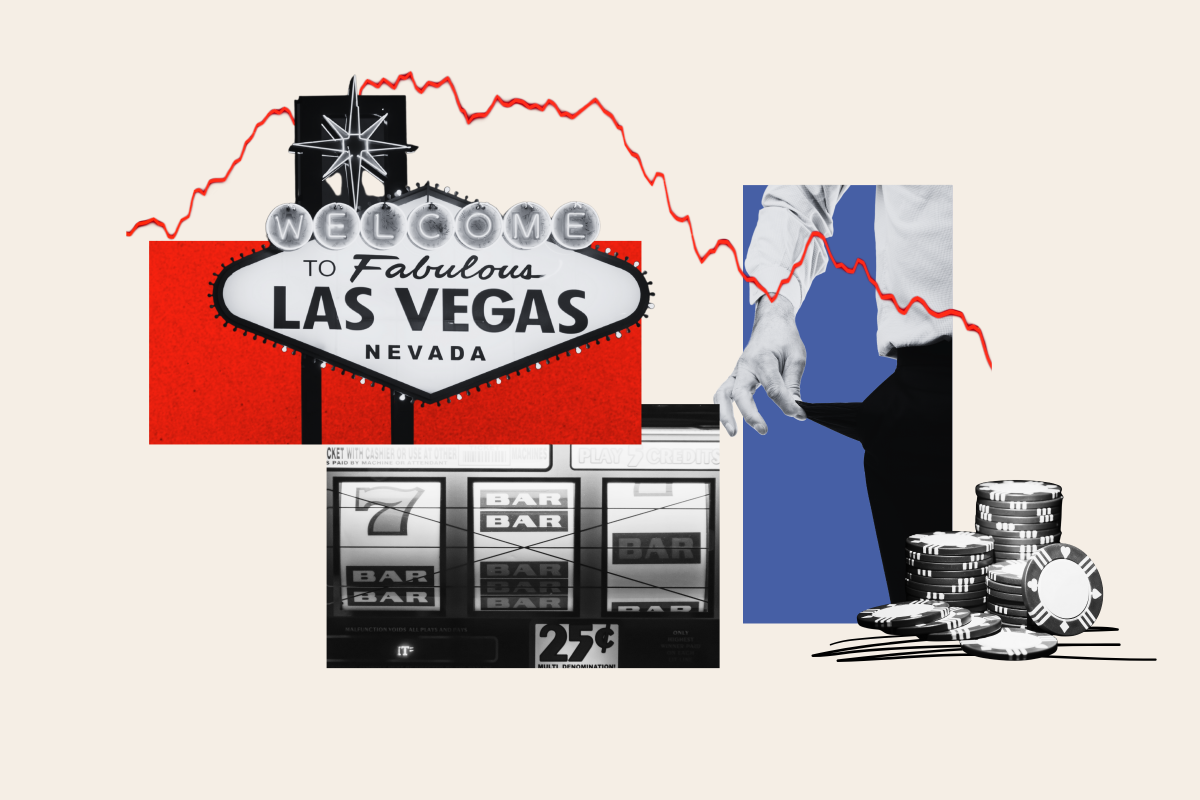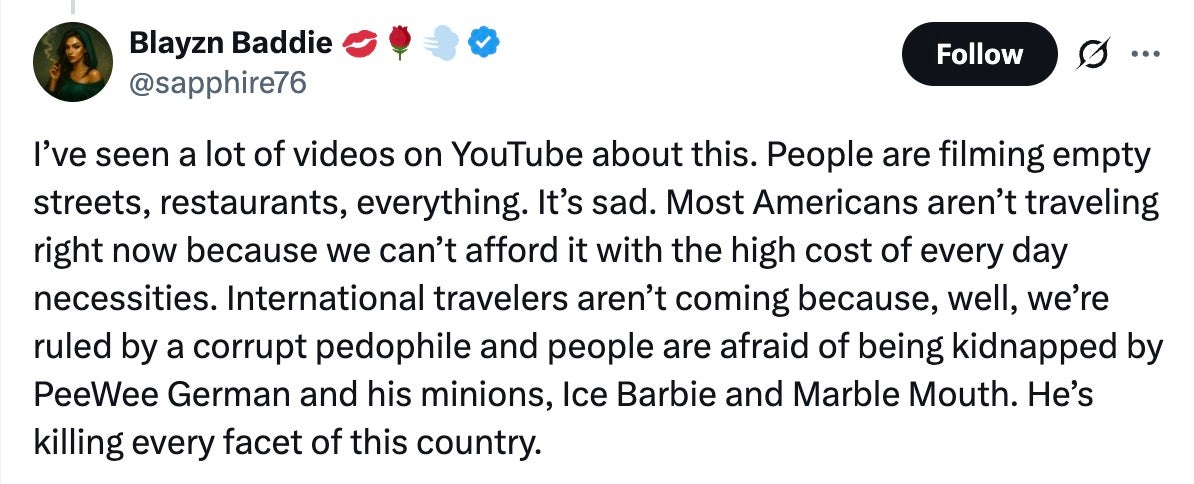The party may soon be over for Las Vegas, as economic challenges and a steady outflow of both visitors and residents threaten to strip the town of its title as the "entertainment capital of the world."
Hotel occupancy rates are dwindling, declining tourism threatens to push Nevada's already nation-leading unemployment rate higher, and casinos—once the beating heart of the Sin City economy—have extended a monthslong streak of falling revenue.
According to recent data from hotel analytics provider STR, hotel occupancy dropped to 66.7 percent in early July, down nearly 17 percent from the same period last year. Vegas also recorded the steepest national declines in average daily rate (ADR) and revenue per available room (RevPar), the latter down 29 percent year-over-year.
Data shows that visitors, both domestic and international, are increasingly steering clear of Vegas, sparked by a period of economic difficulty at home and a wider decline in inbound travel to the U.S.
Jeremy Aguero, senior analyst at the Las Vegas consulting firm Applied Analysis, described this as "a pretty formidable one-two punch" for a city so heavily reliant on flows of outside cash to keep its economy afloat.
"Southern Nevada is more dependent on the tourism industry than any other major market in the United States today," he said, adding that declining tourism is "having a ripple effect" throughout the city's flagship industry.
Gaming revenue across Nevada fell by 2.2 percent in May compared to a year earlier, according to the state's gambling regulator, with the Vegas Strip seeing an even larger drop of 3.87 percent.
Vegas's woes have been attributed in part to the high costs of visitation, with steep room rates, dining costs, and pricy amenities deterring prospective visitors from spending their limited time and funds in Vegas.
"From what I understand, Vegas may be setting itself up for the same situation they went through in 2008-2009," said veteran gaming consultant Bill Zender, "overpricing the market."
As well as dropping visitors, the city has also seen a significant exodus of its residents. According to Realtor.com's June housing report, Vegas has seen the largest increase in housing inventory, with active home listings now 77 percent higher than a year ago.
Robert Little, a real estate agent in Nevada, told Realtor.com that this was due to a marked slowdown in buyer demand, but also investors in the Vegas property market choosing to "cash out and reallocate their funds into other opportunities."

Aguero told Newsweek that one could view Vegas' struggles as a symbol for the economic issues facing all Americans, which have an outsized impact given the city's economy is centered around things – gambling, lavish hotels, and a booming nightlife – that would be considered discretionary and the first to go in times of economic hardship.
"There are some folks that believe that Las Vegas has a tendency to be somewhat recession-resistant," he told Newsweek. "But no one ever has suggested that this community is sort of recession-proof."
"When you look at consumers across the United States, what you're going to see is that consumers are being stressed relative to the cost of living," he added.
A precarious national housing market, declining tourism, and heightened macroeconomic worries among America's spending population have spared few states or cities this year. Las Vegas's own weakening odds must be viewed against this backdrop, Aguero said, but added that these could nevertheless rebound shortly.
This may require adapting pricing strategies to appeal to more cash-strapped visitors, acknowledging that casino gaming is no longer the revenue driver it once was, and expanding into sports and cultural attractions to meet the tastes of the modern American consumer.
"If there's one thing Las Vegas has proven since legalizing gambling in the early 1930s, it's that it is both resilient and resourceful, and it has both the infrastructure investments, but also the capability to reposition itself fairly effectively."
An uptick in videos painting Las Vegas as a ghost town has people wondering where all the tourists have gone.
“I ain’t never seen Vegas look like this on a Saturday at one in the morning,” @chasasworld narrates over a TikTok showing the practically empty streets of Sin City. “Where’s the people? Holy shit, dude.”
And this wasn’t some one-off fluke incident. @chasasworld has repeatedly shared videos taken on different days at different times, explaining how bizarre it’s been lately compared to the activity the city is used to seeing.
“This is a Thursday at 8pm with Beyoncé in town,” she says in another video. “This place is usually packed. Even in the summer, you’re going to see way more people than this.”
She isn’t the only one who’s noticed something is up. There are also videos from other TikTokers exploring both outdoors and inside casinos and hotels, shocked at how empty things have become.
The facts back up these TikTok anecdotes. Compared to the same months in 2024, tourism has consistently been down in Las Vegas in the first half of the year. Hotel occupancy has largely been down as well, and flights into the city from Canada saw a major drop in May.
If this were an isolated problem with Vegas tourism, that would be concerning enough. The city relies on that industry, and a decrease in profit could lead to a decrease in jobs, which can have a ripple effect on the economy.
But Vegas is only one part of a larger problem in which tourism is dropping across the whole country. In fact, Vegas hotels aren’t even the ones that have seen the sharpest summer drop—that would be Houston, Texas.
“[This is] the largest drop we’ve seen year-over-year, month-over–month this century other than in a crisis (such as Sept. 11th terrorist attacks, the pandemic, and Great Recession),” Las Vegas Convention and Visitors Authority CEO Steve Hill said earlier this week. “The top of the market is still doing fine and not having any difficulty, but folks around the country are concerned about their jobs and their financial situation, causing them to hesitate.”
As for why this is happening, everyone’s pointing fingers in a different direction. Companies are charging too much for every little thing. There’s financial uncertainty between whatever’s going on with tariffs on any given day and the overall U.S. economy, international visitors are too afraid or too angry to come to the U.S. because of all the immigration issues.
All of these factors likely play a role in the decline in tourism. Consumer spending within the U.S. has dropped sharply as folks fret over increased prices thanks to Trump’s tariffs. At the same time, international travel to Las Vegas fell by a whopping 13% in June, and Canadian travel to the U.S. has been down across the board in the first half of the year.
It’s unclear how this will play out in moving forward. The new $250 visa charge for some travelers is likely to create some complications. Meanwhile, thinly veiled threats aimed at attendees of international sporting events coming to the U.S. certainly aren’t helping with the optics that the U.S. isn’t currently a safe or welcoming place to foreign travelers.
Social media reacts
As much as some people are determined to believe this is isolated proof that Vegas and only Vegas is finally getting some sort of comeuppance for being an overpriced tourist town, there are plenty of other folks who are taking note and sharing their larger concerns.







